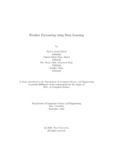| dc.contributor.advisor | Ahmed, Tanvir | |
| dc.contributor.author | Fahad, Sheikh Abdul | |
| dc.contributor.author | Trina Akand, Takowa Islam | |
| dc.contributor.author | Ahammed Raju, Md. Reaj Uddin | |
| dc.contributor.author | Yadav, Ranjita | |
| dc.date.accessioned | 2023-04-13T08:35:19Z | |
| dc.date.available | 2023-04-13T08:35:19Z | |
| dc.date.copyright | 2022 | |
| dc.date.issued | 2022-09 | |
| dc.identifier.other | ID: 18101462 | |
| dc.identifier.other | ID: 17101333 | |
| dc.identifier.other | ID: 17101385 | |
| dc.identifier.other | ID: 18201202 | |
| dc.identifier.uri | http://hdl.handle.net/10361/18149 | |
| dc.description | This thesis is submitted in partial fulfillment of the requirements for the degree of Bachelor of Science in Computer Science, 2022. | en_US |
| dc.description | Cataloged from PDF version of thesis. | |
| dc.description | Includes bibliographical references (pages 38-40). | |
| dc.description.abstract | Global human life is significantly impacted by weather forecasts. It takes a lot of computing resources
to solve mathematical equations that are based on climatic circumstances. As a result, during the
past ten years, deep learning algorithms have been integrated with enormous amounts of weather
observation data. At the moment, a lot of data is being consumed. So, we can increase the accuracy
of weather forecasts by combining this enormous amount of data with deep learning methods. In
this paper, we implement benchmark datasets for autoencoder and linear regression. We are using
z500 dataset, temp 2m dataset and t850 data set. As training the linear regression on the full data
will take a lot of memory which is why we took every 5th time step that almost give the same result.
Using a linear regression approach and an auto encoder model, we trained and obtained day-level
predictions using the ERA5 reanalysis dataset (Hersbach et al., 2020) to determine the accuracy of
the test data and training data. | en_US |
| dc.description.statementofresponsibility | Sheikh Abdul Fahad | |
| dc.description.statementofresponsibility | Takowa Islam Trina Akand | |
| dc.description.statementofresponsibility | Md. Reaj Uddin Ahammed Raju | |
| dc.description.statementofresponsibility | Ranjita Yadav | |
| dc.format.extent | 40 pages | |
| dc.language.iso | en | en_US |
| dc.publisher | Brac University | en_US |
| dc.rights | Brac University theses are protected by copyright. They may be viewed from this source for any purpose, but reproduction or distribution in any format is prohibited without written permission. | |
| dc.subject | Deep learning | en_US |
| dc.subject | Weather forecasting | en_US |
| dc.subject | Linear regression | en_US |
| dc.subject | Auto encoder | en_US |
| dc.subject | Prediction | en_US |
| dc.subject | de-noise | en_US |
| dc.subject | Linear regression analysis | en_US |
| dc.subject.lcsh | Machine learning. | |
| dc.subject.lcsh | Machine learning--Statistical methods--Congresses. | |
| dc.title | Weather forecasting using Deep Learning | en_US |
| dc.type | Thesis | en_US |
| dc.contributor.department | Department of Computer Science and Engineering, Brac University | |
| dc.description.degree | B. Computer Science | |

